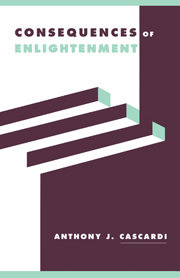Book contents
- Frontmatter
- Contents
- Acknowledgments
- 1 The consequences of Enlightenment
- 2 Aesthetics as critique
- 3 The difficulty of art
- 4 Communication and transformation: aesthetics and politics in Habermas and Arendt
- 5 The role of aesthetics in the radicalization of democracy
- 6 Infinite reflection and the shape of praxis
- 7 Feeling and/as force
- Index
1 - The consequences of Enlightenment
Published online by Cambridge University Press: 22 September 2009
- Frontmatter
- Contents
- Acknowledgments
- 1 The consequences of Enlightenment
- 2 Aesthetics as critique
- 3 The difficulty of art
- 4 Communication and transformation: aesthetics and politics in Habermas and Arendt
- 5 The role of aesthetics in the radicalization of democracy
- 6 Infinite reflection and the shape of praxis
- 7 Feeling and/as force
- Index
Summary
There has always existed in the world, and there will always continue to exist, some kind of metaphysics.
Immanuel KantPhilosophy, which once seemed obsolete, lives on because the moment to realize it was missed. The summary judgment that it had merely interpreted the world, that resignation in the face of reality had crippled it in itself, becomes a defeatism of reason after the attempt to change the world miscarried … Having broken its pledge to be as one with reality or at the point of realization, philosophy is obliged ruthlessly to criticize itself.
Theodor AdornoWe have art – lest we perish of the truth.
Friedrich NietzscheThe present volume represents an attempt to reassess the relationship between certain issues in contemporary critical theory and the question of Enlightenment. I take my bearings by reference to claims about the self-canceling nature of Enlightenment rationality as formulated in the opening essay of Max Horkheimer and Theodor Adorno's Dialectic of Enlightenment (“The Concept of Enlightenment”), and move conceptually from there to address the ways in which their concerns can be reevaluated in light of an aesthetic critique modeled along lines sketched out in Kant's Critique of Judgment. More broadly, I hope to account for the predominantly “aesthetic” forms in which a critical self-consciousness carried forward from the Enlightenment has survived the critique of enlightened reason that seemed to have reached an impasse in Horkheimer and Adorno's essay.
- Type
- Chapter
- Information
- Consequences of Enlightenment , pp. 1 - 48Publisher: Cambridge University PressPrint publication year: 1999

